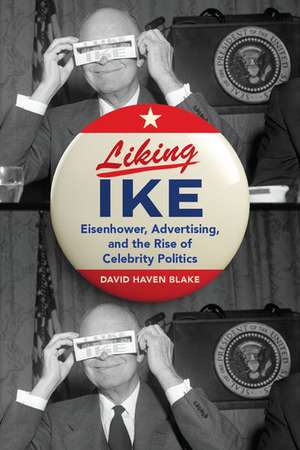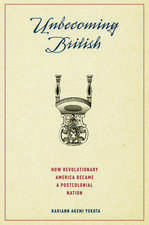Liking Ike: Eisenhower, Advertising, and the Rise of Celebrity Politics
Autor David Haven Blakeen Limba Engleză Hardback – 8 sep 2016
Preț: 319.02 lei
Preț vechi: 367.01 lei
-13% Nou
Puncte Express: 479
Preț estimativ în valută:
61.05€ • 65.28$ • 50.90£
61.05€ • 65.28$ • 50.90£
Carte disponibilă
Livrare economică 17-24 martie
Preluare comenzi: 021 569.72.76
Specificații
ISBN-13: 9780190278182
ISBN-10: 0190278188
Pagini: 298
Ilustrații: 36 illus.
Dimensiuni: 163 x 241 x 31 mm
Greutate: 0.54 kg
Editura: Oxford University Press
Colecția OUP USA
Locul publicării:New York, United States
ISBN-10: 0190278188
Pagini: 298
Ilustrații: 36 illus.
Dimensiuni: 163 x 241 x 31 mm
Greutate: 0.54 kg
Editura: Oxford University Press
Colecția OUP USA
Locul publicării:New York, United States
Recenzii
[A] lively and entertaining chronicle of the intersection of politics, advertising and celebrity in the 1950s Liking Ike makes an important contribution to our understanding of how modern politics has developed, particularly through the commodification of the presidency itself and the changing nature of Americans' relationship to the concept of celebrity David Haven Blake has succeeded in producing a book that stands on its own terms as a significant piece of historical research, while also prompting the reader to consider how we choose our political leaders and the means by which the foundations of presidential images are created.
A highly entertaining and informative book for collections on the media and American politics. Highly recommended.
Liking Ike is the most comprehensive treatment yet of the ways in which the two Eisenhower presidential campaigns launched the commodification of American politicians.
David Haven Blake's Liking Ike is an outstanding contribution to the growing literature exploring the intimate links between Hollywood and politics. His lively narrative reveals how during the early 1950s, movie stars and advertising agencies recognized the importance of television and worked with Dwight Eisenhower to transform the ways in which candidates were sold to a mass audience of potential voters.
Liking Ike leavens the necessity of advertising with the buoyant yeast of celebrity when television was new. Blake's carefully researched and elegantly argued political history of celebrity's charming and disarming effects upon the American presidential campaign and the conduct of government arrives not a moment too soon.
Liking Ike has never been easier than in David Blake's fascinating account of the transformation of the heroic General Dwight David Eisenhower into Ike, the plain-spoken man from Abilene. Madison Avenue used television to mobilize voters by reassuring them that Eisenhower was someone they could relate to, and exposing the back room machinations of entrenched local Republicans. A good read for anyone interested in the intersection of media and politics.
[Liking Ike] serves as a useful account about the beginning of the modern presidential campaign, as we have come to know it ... We would all do well, in this environment, to meditate on the story Blake tells and to begin to reimagine how our politics can be different going forward.
This excellent book is an important contribution to the study of politics and culture in the United States.
A highly entertaining and informative book for collections on the media and American politics. Highly recommended.
Liking Ike is the most comprehensive treatment yet of the ways in which the two Eisenhower presidential campaigns launched the commodification of American politicians.
David Haven Blake's Liking Ike is an outstanding contribution to the growing literature exploring the intimate links between Hollywood and politics. His lively narrative reveals how during the early 1950s, movie stars and advertising agencies recognized the importance of television and worked with Dwight Eisenhower to transform the ways in which candidates were sold to a mass audience of potential voters.
Liking Ike leavens the necessity of advertising with the buoyant yeast of celebrity when television was new. Blake's carefully researched and elegantly argued political history of celebrity's charming and disarming effects upon the American presidential campaign and the conduct of government arrives not a moment too soon.
Liking Ike has never been easier than in David Blake's fascinating account of the transformation of the heroic General Dwight David Eisenhower into Ike, the plain-spoken man from Abilene. Madison Avenue used television to mobilize voters by reassuring them that Eisenhower was someone they could relate to, and exposing the back room machinations of entrenched local Republicans. A good read for anyone interested in the intersection of media and politics.
[Liking Ike] serves as a useful account about the beginning of the modern presidential campaign, as we have come to know it ... We would all do well, in this environment, to meditate on the story Blake tells and to begin to reimagine how our politics can be different going forward.
This excellent book is an important contribution to the study of politics and culture in the United States.
Notă biografică
David Haven Blake is Professor of English at The College of New Jersey. His previous publications include Walt Whitman and the Culture of American Celebrity (Yale University Press, 2006), and Walt Whitman, Where the Future Becomes Present (University of Iowa Press, 2008).













